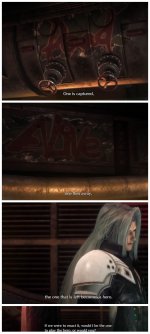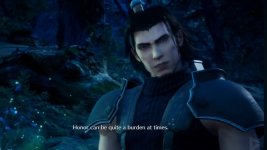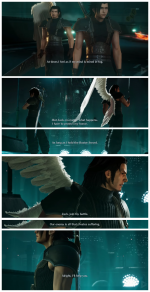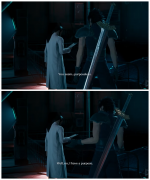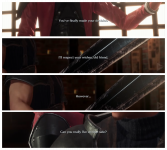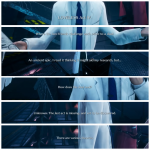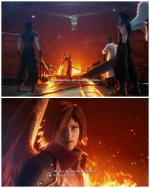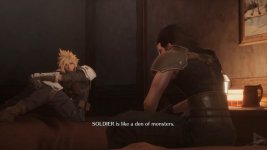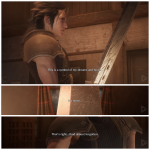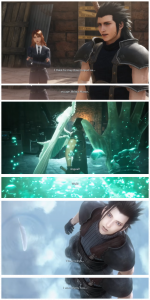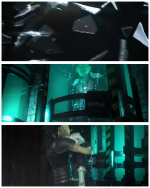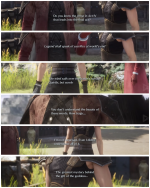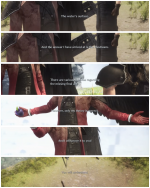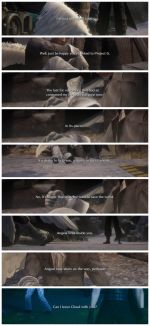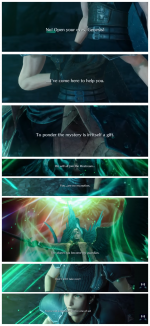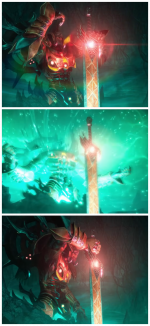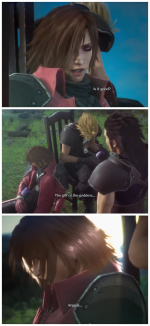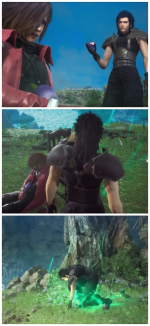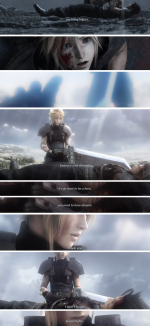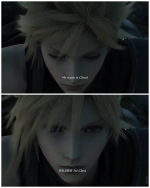Rydeen
In-KWEH-dible
Throughout CC, we live through Zack, sympathizing with his frustration and trauma, and confused by the motivations of our deserting teammates. Angeal and Genesis attempt to explain their actions and motivations in abstract ways - in Genesis' case, through quoting Loveless incessantly. During my real-time experience as a player, the villains' behavior was very frustrating and unrelatable to me and these feelings were unresolved by the end. I still feel like it was poorly executed, but I am trying to make an effort to understand what the writers were trying to convey because I don't want to hate Crisis Core. I don't want to believe that it's a pseudo-philosophical hot mess pretending to be something more profound. Perhaps the opacity of CC's characters and themes can also be partially attributed to translation or language barrier. After spending some time analyzing things, CC feels a little more cogent. But it's all still very nebulous and to get a consistent metaphorical structure is tough, especially when there could be triple meanings..
The content of Loveless that we are aware of embodies a theme of salvation (obviously through Jenova, at least as interpreted by Genesis). But this salvation is vague, as Angeal admits when he tells Zack that the "Gift of the Goddess" is a mystery even to him. The only thing that seems constant to their cult/belief system is a desire for destruction, essentially making it a death cult.
Below I expound on some thoughts and musings as I attempt to analyze Loveless from the perspective of Angeal and Genesis. Considering many of you guys have played these games many more times than I have (I played CC once, almost 7 years ago) and are much more intimately familiar with the pages and pages of Utimania materials, I'd like to know what you think.
Jenova's arrival, depicted as a savior.
I would consider Genesis and Angeal to be wandering souls. Their entire existence was designated to do nothing but serve Shinra's ends (as killing machines - of course they'd eventually bite the hand that fed), but only through the exploitation of the alien parasite that was permanently infused into their being. Their "lineage" "erased" and exploited, their lineage a monster. They felt betrayed by Shinra, which was their only reason for living (aside from their friendship), which created a psychological vacuum. I think "infinite in mystery" alludes to them seeking for a purpose and meaning that they will never find, because they no longer feel human and can't relate to other human beings. Perhaps the mysterious "Gift of the Goddess" they are searching for is just the meaning to their lives. Their only solace is in Jenova, whom they project onto the fabled Goddess, and her vague promise of salvation.
I don't know how they can view Jenova in such a way as the first stanza of this act, but perhaps this is the mind control talking.
Wings stripped away is ironic imagery if we apply it to the loss of their pride and dreams, because the wings that they have are what stripped their pride and dreams as humans. They bare their wings as Jenova exerts her influence. Is SE going for dramatic irony here?
Sounds like a pitch to convert their genetic, "monster" kin to "Jenova-ism."
I really don't know what to say about this - as it relates to the rest of the Loveless content.
Referring to the Reunion. Very ironic how Jenova is depicted as the one that will "become the dew that quenches the land" when she has an even more voracious appetite for the planet's life than Shinra.
Perhaps this epic refers to the Lifestream and Holy, and the tragedy is Genesis falsely attributing it to Jenova, a sort of false prophet and satanic figure, who seems to exert her insidious psychological and spiritual influence (especially when they become weakened by doubt in the first place, much like how Geostigma is contracted) over everyone except Sephiroth, who is able to use her for his own ends. Sephiroth, to me, was the only deserter whose motivations and personality made some degree of sense to me up front.
The content of Loveless that we are aware of embodies a theme of salvation (obviously through Jenova, at least as interpreted by Genesis). But this salvation is vague, as Angeal admits when he tells Zack that the "Gift of the Goddess" is a mystery even to him. The only thing that seems constant to their cult/belief system is a desire for destruction, essentially making it a death cult.
Below I expound on some thoughts and musings as I attempt to analyze Loveless from the perspective of Angeal and Genesis. Considering many of you guys have played these games many more times than I have (I played CC once, almost 7 years ago) and are much more intimately familiar with the pages and pages of Utimania materials, I'd like to know what you think.
Prologue
When the war of the beasts brings about the world's end
The goddess descends from the sky
Wings of light and dark spread afar
She guides us to bliss, her gift everlasting
Jenova's arrival, depicted as a savior.
Act I
Infinite in mystery is the gift of the Goddess
We seek it thus, and take to the sky
Ripples form on the water's surface
The wandering soul knows no rest.
I would consider Genesis and Angeal to be wandering souls. Their entire existence was designated to do nothing but serve Shinra's ends (as killing machines - of course they'd eventually bite the hand that fed), but only through the exploitation of the alien parasite that was permanently infused into their being. Their "lineage" "erased" and exploited, their lineage a monster. They felt betrayed by Shinra, which was their only reason for living (aside from their friendship), which created a psychological vacuum. I think "infinite in mystery" alludes to them seeking for a purpose and meaning that they will never find, because they no longer feel human and can't relate to other human beings. Perhaps the mysterious "Gift of the Goddess" they are searching for is just the meaning to their lives. Their only solace is in Jenova, whom they project onto the fabled Goddess, and her vague promise of salvation.
Act II
There is no hate, only joy
For you are beloved by the goddess
Hero of the dawn, Healer of worlds
Dreams of the morrow hath the shattered soul
Pride is lost
Wings stripped away, the end is nigh
I don't know how they can view Jenova in such a way as the first stanza of this act, but perhaps this is the mind control talking.
Wings stripped away is ironic imagery if we apply it to the loss of their pride and dreams, because the wings that they have are what stripped their pride and dreams as humans. They bare their wings as Jenova exerts her influence. Is SE going for dramatic irony here?
Act III
My friend, do you fly away now?
To a world that abhors you and I?
All that awaits you is a somber morrow
No matter where the winds may blow
My friend, your desire
Is the bringer of life, the gift of the goddess
Even if the morrow is barren of promises
Nothing shall forestall my return
Sounds like a pitch to convert their genetic, "monster" kin to "Jenova-ism."
Act IV
My friend, the fates are cruel
There are no dreams, no honor remains
The arrow has left the bow of the goddess
My soul, corrupted by vengeance
Hath endured torment, to find the end of the journey
In my own salvation
And your eternal slumber
Legend shall speak
Of sacrifice at world's end
The wind sails over the water's surface
Quietly, but surely
I really don't know what to say about this - as it relates to the rest of the Loveless content.
Act V
Even if the morrow is barren of promises
Nothing shall forestall my return
To become the dew that quenches the land
To spare the sands, the seas, the skies
I offer thee this silent sacrifice
Referring to the Reunion. Very ironic how Jenova is depicted as the one that will "become the dew that quenches the land" when she has an even more voracious appetite for the planet's life than Shinra.
Perhaps this epic refers to the Lifestream and Holy, and the tragedy is Genesis falsely attributing it to Jenova, a sort of false prophet and satanic figure, who seems to exert her insidious psychological and spiritual influence (especially when they become weakened by doubt in the first place, much like how Geostigma is contracted) over everyone except Sephiroth, who is able to use her for his own ends. Sephiroth, to me, was the only deserter whose motivations and personality made some degree of sense to me up front.
Last edited:


 I always assumed Loveless was a piece of cod-poetry dashed off by the writers once they'd decided they were going to give Genesis a personality by making him obsessed about a poem. What we see in the game cannot be the whole thing. It would be the shortest work of classic literature ever - especially given that it aspires to be some kind of epic poetry. I don't mean that the game-makers wrote more of it; I mean they always intended us to understand that it was just a fragment of the complete work. The symbolism is opaque. When I was playing the game I thought the goddess meant Jenova and expected that at some point poor Genesis would discover what a deluded sap he'd been, but then Minerva suddenly appeared and redeemed him and I have no idea who she is or how she fits into their mythology.
I always assumed Loveless was a piece of cod-poetry dashed off by the writers once they'd decided they were going to give Genesis a personality by making him obsessed about a poem. What we see in the game cannot be the whole thing. It would be the shortest work of classic literature ever - especially given that it aspires to be some kind of epic poetry. I don't mean that the game-makers wrote more of it; I mean they always intended us to understand that it was just a fragment of the complete work. The symbolism is opaque. When I was playing the game I thought the goddess meant Jenova and expected that at some point poor Genesis would discover what a deluded sap he'd been, but then Minerva suddenly appeared and redeemed him and I have no idea who she is or how she fits into their mythology. 